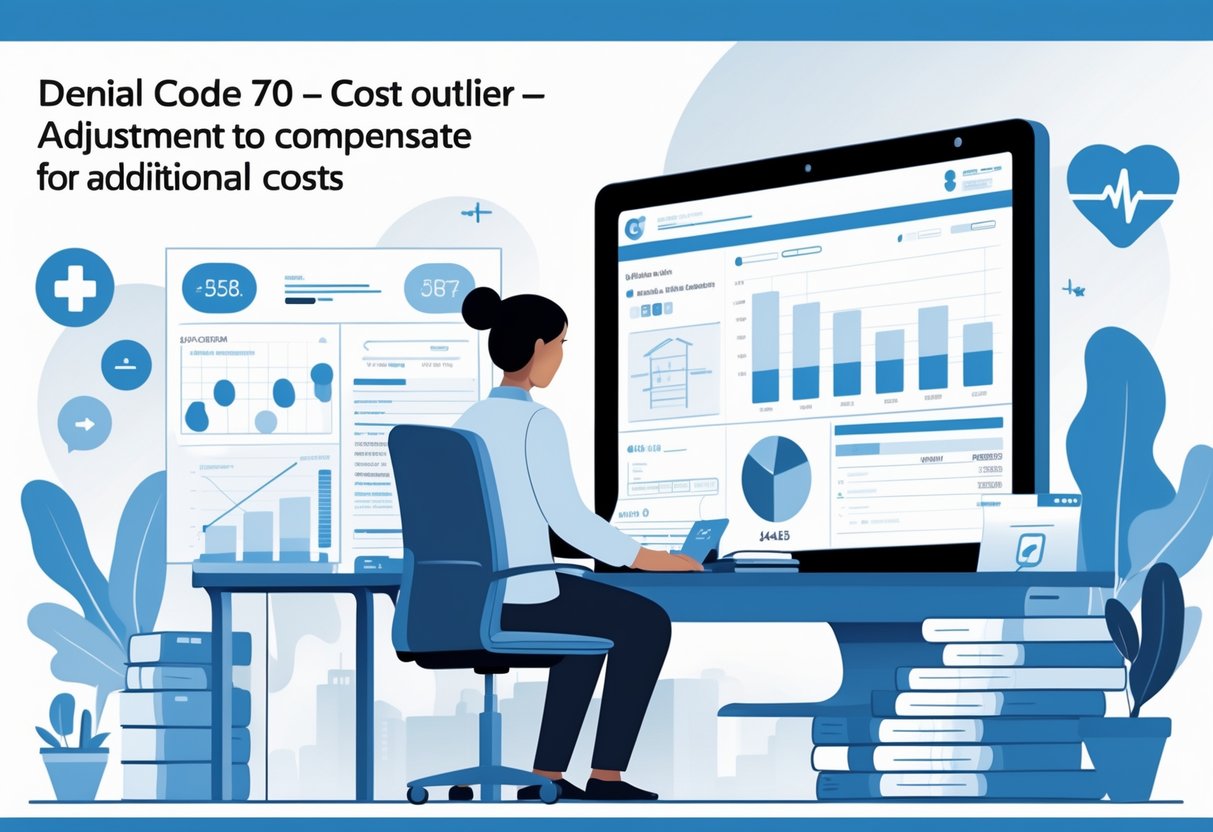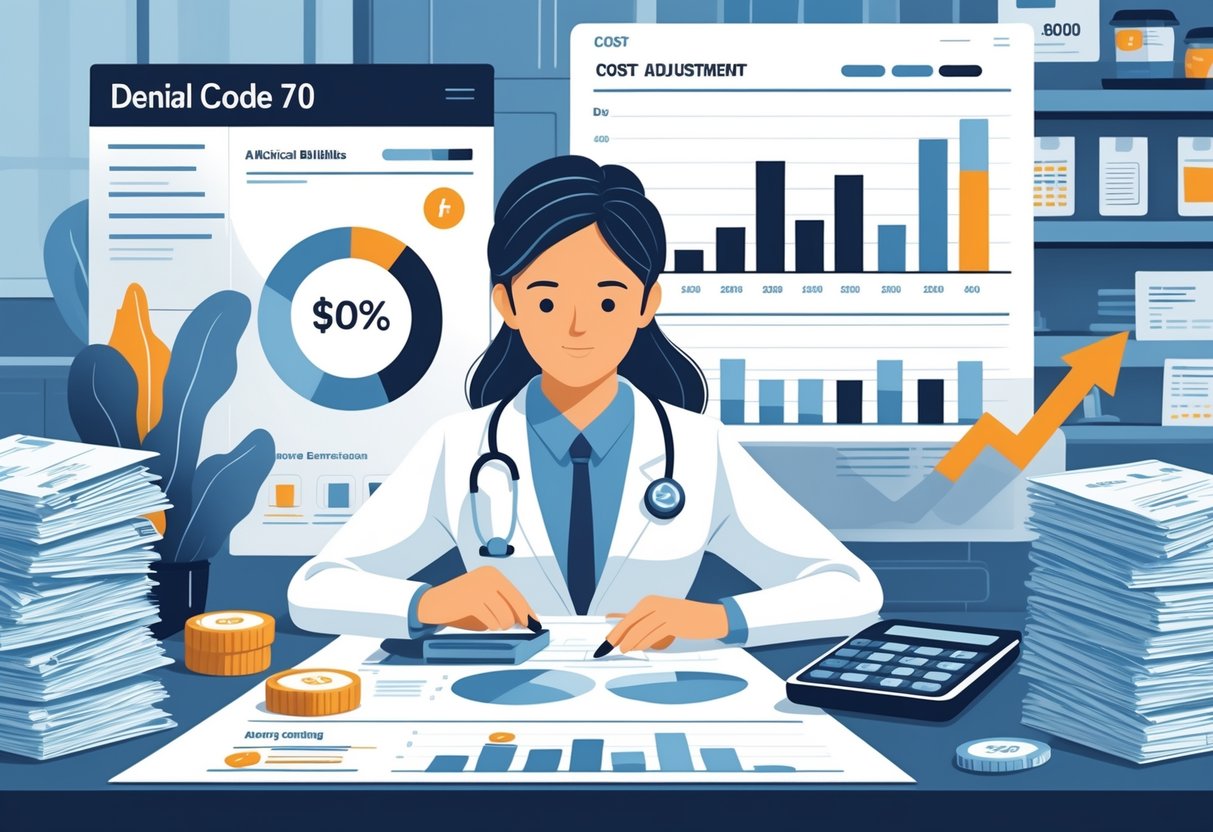Denial code 70 means your claim faced an adjustment because the costs were higher than usual. It is used to compensate for extra expenses that go beyond the standard payment rate. This code helps explain why the payment amount you expected was changed.
Understanding denial code 70 is key if you want to know how additional costs are handled in medical billing. When services are more expensive than normal, this adjustment makes sure those costs are covered properly.
If you manage claims or handle billing, knowing what triggers denial code 70 can save you time and reduce confusion. It shows how payers balance regular charges with cases that require more resources.
Understanding Denial Code 70 – Cost Outlier – Adjustment to Compensate for Additional Costs

Denial Code 70 deals with situations where your medical claim shows extra expenses beyond typical cases. It adjusts payments to reflect these higher costs properly.
Definition and Purpose
Denial Code 70 refers to a cost outlier adjustment. This means the claim involves costs much higher than usual for a specific procedure or diagnosis. The adjustment helps compensate providers for these extra expenses.
You might see this code when billing for inpatient care with unusually long stays or costly treatments. It ensures providers are reimbursed fairly when standard payment rates don’t cover actual costs.
The purpose is to balance payment accuracy while controlling overall healthcare spending. It acknowledges that some cases need more resources than average.
Situations Leading to Cost Outliers
Cost outliers happen when patient care requires significantly more resources. Examples include longer hospital stays, expensive medications, or complex surgeries.
If your claim shows hospital costs above a set threshold, it triggers this adjustment. For instance, treating severe injuries or rare diseases might cause a cost outlier.
The hospital or provider has to submit detailed documentation proving the additional costs. Without proper evidence, the claim may not qualify for the adjustment.
Distinction From Other Denial Codes
Denial Code 70 is specific to extra costs beyond normal payment rates. Other denial codes usually address coding errors, missing information, or policy exclusions.
Unlike codes that reject claims due to mistakes, Code 70 accepts the claim but modifies payment because costs are higher. It doesn’t deny service coverage but adjusts reimbursement levels.
You should not confuse this with denials that require claim resubmission or corrections. Code 70 focuses solely on cost variations in treatment or care.
Common Reasons for Denial Code 70

Denial code 70 often arises because of costs that go beyond standard payment limits. These rejections usually involve specific billing issues, the nature of the services, or missing details in your submitted paperwork.
High-Cost Services or Procedures
This denial often happens when the services you provide are more expensive than typical cases. Hospitals and clinics might perform surgeries or treatments that take longer or need extra supplies. Insurance companies flag these as “cost outliers” because they cost more than usual.
If you perform complex procedures or use special equipment, expect additional costs. You’ll need to prove why these services were necessary. Without proper justification, insurance may deny extra payment, causing your claim to get code 70.
Incorrect Billing Practices
Using wrong billing codes can trigger this denial. Sometimes you might bill for high-cost items or services that do not match the actual care given. Errors like duplicate charges or charging for non-covered items also cause problems.
Check your bills carefully. Make sure the codes reflect the treatments you provided. Accurate coding helps avoid confusion and speeds up claim approval. If your billing practices are off, claims processors see these charges as excessive and flag them with denial code 70.
Inadequate Documentation
Without solid paperwork, insurers won’t approve extra costs. Your records need to clearly explain why the service cost more. Missing notes on the patient’s condition, treatment details, or length of stay can cause denials.
Always attach full documentation with your claims. Include notes about complications, use of extra resources, and medical necessity. Detailed records support your request for additional payment and reduce the chance of code 70 denials.
Impact on Healthcare Providers and Patients
Denial code 70 affects both healthcare providers and patients in specific ways. It influences the money providers receive and the bills patients may get. Understanding these effects helps you navigate healthcare costs better.
Financial Implications for Providers
When you see denial code 70, it means the provider made extra costs during treatment. The adjustment is meant to cover these additional expenses. But if the documentation is unclear or incomplete, insurance may deny or delay payment.
This delay affects your cash flow. It can also increase administrative work, as providers must resubmit claims or appeal denials. Providers may face pressure to improve record-keeping or coding accuracy to avoid repeated denials.
If payments are reduced or denied, providers might need to adjust budgets or cut back on services. This can also impact smaller clinics more than large hospitals due to tighter financial margins.
Patient Billing Consequences
For you as a patient, denial code 70 can mean unexpected bills. If insurers reject or reduce payments for extra costs, providers may try to recover the money from you.
You might receive higher out-of-pocket costs because your insurance isn’t covering the full amount. This can happen especially if you don’t have full coverage or if the claim is under review for a while.
It’s important to check your bills closely when you notice this denial code. You may need to contact your provider or insurer to understand what costs you are responsible for and why.
Appealing and Resolving Denial Code 70
To handle a denial code 70, you must gather accurate documents, follow the right appeal steps, and meet all deadlines. Being organized and timely will improve your chances of success.
Reviewing and Gathering Required Documentation
Start by collecting all records related to the case. This includes patient medical records, billing statements, and cost reports showing additional expenses.
Focus on documents proving the extra costs justify the cost outlier adjustment. Make sure your paperwork is clear, complete, and matches the payer’s requirements.
Check for any missing or incorrect data before submitting. You want your evidence to be easy to review and persuasive. This reduces the chance your appeal will be rejected due to form or content issues.
Steps for Successful Appeals
Begin your appeal by clearly stating why you believe the denial is wrong. Use specific facts and medical or financial data related to the case.
Organize your appeal letter to mirror the payer’s appeal process. Attach all supporting documents with clear labels and explanations.
Keep a copy of everything you send and track your submissions. Follow up if you do not get a response within the expected time frame.
Timelines and Best Practices
File your appeal as soon as possible. Most payers have strict deadlines, often 30 to 60 days from the denial date. Missing this window can mean losing your chance to be reimbursed.
Document every step, including phone calls, emails, and letters. Use certified mail or electronic systems that confirm receipt.
Stay professional and factual in all communications. Avoid emotional language or unsupported claims, as this may harm your appeal.
Prevention Strategies for Denial Code 70
To reduce the risk of denial code 70, focus on accurate documentation and clear communication with payers. Both help ensure the extra costs are justified and understood before claims are processed.
Clinical and Billing Documentation Improvements
You need to document all additional costs clearly and thoroughly. This includes detailed notes on why extra resources or services were required. Use specific terms and include any supporting evidence, like test results or specialist reports.
Make sure your billing codes match the clinical information exactly. Review your entries for errors or missing information that could cause confusion. Regular training for your staff on documentation standards can help keep accuracy high.
Use checklists or templates to standardize how you record cost outlier cases. This reduces the chance of forgetting key details. Also, audit your records regularly to spot and fix issues before submitting claims.
Proactive Communication With Payers
Contact payers early when you expect to submit a cost outlier claim. Inform them about the extra costs and reasons behind them. This can prevent surprises that lead to denials.
Establish clear points of contact at the insurance company so you know whom to reach with questions or additional information. Document all interactions, including phone calls and emails, for future reference.
You should also ask payers about any specific criteria or forms they require for cost outlier adjustments. Providing everything they need upfront speeds up the review process and reduces denials.
Frequently Asked Questions
You need to understand the criteria and process behind denial code 70. Knowing how to handle appeals, required documents, and how Medicare reimbursement is calculated will help you manage claims better. Also, stay updated on any policy changes related to cost outlier adjustments.
What are the standard criteria for determining a cost outlier adjustment under denial code 70?
The adjustment applies when the actual costs for a claim are significantly higher than typical cases. It usually involves exceeding specific cost thresholds set by Medicare or the payer. The extra costs must be justified by detailed billing and patient care data.
How can healthcare providers appeal a denial based on a cost outlier adjustment?
You must submit a formal written appeal with supporting documentation. This includes detailed cost reports and explanations of why costs were higher. Follow the payer’s guidelines and deadlines carefully to avoid losing your chance to appeal.
Can the application of denial code 70 be specific to certain medical procedures or diagnoses?
Yes. Cost outlier adjustments often apply to complex or rare procedures that are expensive. Some diagnoses that require longer hospital stays or special treatments can trigger this adjustment more frequently.
What documentation is necessary to prevent a cost outlier adjustment denial on a claim?
Keep detailed records of all services provided, including itemized bills, medical notes, and cost breakdowns. Documentation must clearly show why costs exceed normal amounts. Proper coding and accurate cost reporting are essential.
How does denial code 70 affect the calculation of Medicare reimbursement?
It adjusts the payment upward to cover additional costs beyond standard rates. When approved, it increases the total reimbursement for certain claims. Denials mean you only receive standard payments without extra cost compensation.
Are there any recent changes in policy regarding cost outlier adjustments that providers should be aware of?
Updates may include revised cost thresholds or new documentation requirements. Some payers have tightened rules to prevent misuse. Always check the latest Medicare manuals and payer bulletins for current guidance.








3 thoughts on “Denial Code 70 Cost Outlier Adjustment to Compensate for Additional Costs Explained”